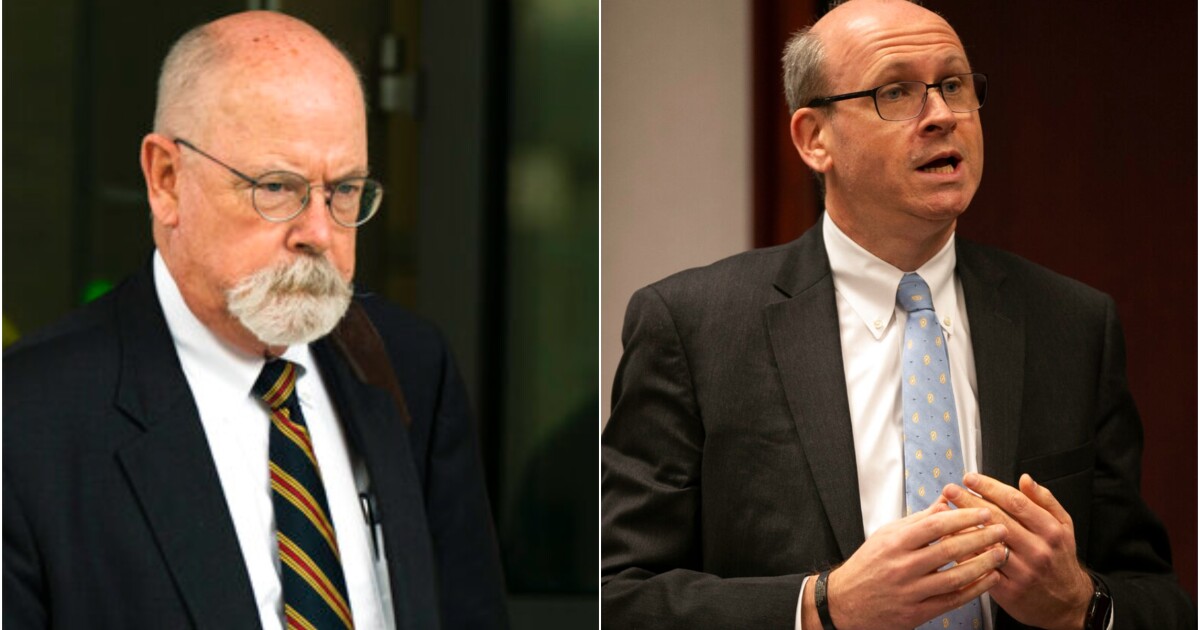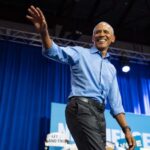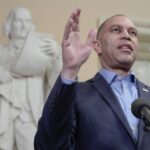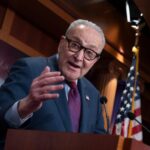

Marc Elias, the top lawyer for Hillary Clinton’s 2016 presidential campaign, was pressed on his role in pushing Trump-Russia collusion claims when he took the stand Wednesday in special counsel John Durham’s case against Democratic cybersecurity lawyer Michael Sussmann.
Elias, who started the Elias Law Group last year, was the Clinton campaign’s general counsel and hired the opposition research firm Fusion GPS, which hired British ex-spy Christopher Steele in 2016. Elias previously said he was aware of Fusion’s plans to have the discredited dossier author brief reporters during the 2016 contest, met with Steele in 2016, and periodically briefed the campaign about the findings from Fusion and Steele. Elias coordinated closely with Sussmann, his former Perkins Coie law firm colleague, on anti-Trump research in 2016.
Sussmann was charged last year with concealing his clients, Clinton’s 2016 presidential campaign and “Tech Executive-1,” known to be former Neustar executive Rodney Joffe, from FBI general counsel James Baker when he presented debunked allegations suggesting a secret back channel between the Trump Organization and Russia’s Alfa-Bank during a September 2016 meeting.
Elias was questioned Wednesday by Durham prosecutor Andrew DeFilippis. When asked if he believed what Fusion did for Perkins was opposition research, Elias said he wouldn’t necessarily consider it that, but “I don’t want to quibble. We hired an investigative firm.”
He said most of his interactions with Fusion were in-person, pointing to weekly “check-ins” at his Perkins office and phone calls in between. Elias said his meetings were typically with both Fusion co-founders Glenn Simpson and Peter Fritsch and “sometimes another guy”: Fusion researcher Jake Berkowitz, who, it is known, focused heavily on the Alfa Bank claims.
Elias said the purpose of the meeting was “to discuss needs that I had and the fruits of what they had — of their work.”
He claimed Fusion focused on Trump’s “litigiousness” and also acted as a “general contractor” for him when he needed public records. Elias said that “as things went along, there was a bucket” related to the “unusual connections” Trump and his associates allegedly had to Russia and the “affinity” he claimed they had for President Vladimir Putin.
FBI AGENT SAYS HE REJECTED ALFA BANK CLAIMS WITHIN DAYS
The Durham indictment said Sussmann, Joffe, and Elias “coordinated and communicated about the [Alfa-Bank] allegations during telephone calls and meetings, which Sussmann billed to the Clinton Campaign” during the 2016 election.
Elias, dressed in a white shirt and dark suit and wearing a blue tie, punctuated his testimony repeatedly with friendly laughter.
When asked who at Perkins was aware he’d hired Fusion, Elias said Wednesday a few members of the firm were, including the defendant, saying: “Michael Sussmann was — because of reasons I suspect we’re here today.”
Elias said he managed the billing for the Perkins lawyers working on the campaign.
He said one of the people whom he worked closest with was Debbie Fine, a Clinton campaign deputy general counsel who also testified about her work with Elias and her interactions with Fusion on Wednesday. Elias said Fine “oversaw projects that intersected with Fusion.”
The prosecution entered into evidence an April 2015 retention letter in which Clinton campaign lawyer Robby Mook formally hired Elias and Fusion. Elias said he interacted with Mook frequently.
Elias said that “probably only Debbie” knew of Fusion by name, while Mook “was aware that I had hired consultants, but I don’t believe he knew who the consultants were.”
Elias testified that the Clinton campaign had a “robust research department” doing “opposition research” and the Democratic National Committee focused on that too.
He said he was “mostly dealing with the senior staff of the campaign” and that “if I had one boss on the campaign, it was Robby.” But he said he was also responsive to Clinton campaign chairman John Podesta and also interacted with campaign spokeswoman Jennifer Palmieri and campaign policy director Jake Sullivan, who is now President Joe Biden’s national security adviser.
Elias said members of the Clinton campaign were aware that someone he was working with was looking into Trump-Russia issues. He said those in the know included Mook, Podesta, Palmieri, Sullivan, and the campaign’s cyber, tech, operations, and legal departments.
‘A TRIAL ABOUT PRIVILEGE’: DURHAM AND SUSSMANN CLASH IN COURT
Elias said he spoke with Clinton herself “relatively infrequently” and said he was invited to meetings or calls six or seven times where she may have been present.
Durham has said members of the Clinton campaign, Fusion, and Perkins played a coordinating role in pushing collusion claims and that Elias was part of the “joint venture” in 2016. Sussmann and Elias worked for Perkins at the time, and Fusion pushed Alfa-Bank claims too.
As part of the Clinton campaign’s efforts to assert attorney-client privilege in the Sussmann case, Elias submitted a recent redacted declaration claiming, “I provided Fusion direction on the research and information I thought would help me perform my job.”
Fritsch and Simpson wrote in their 2019 book that they met with Elias in April 2016 and Elias wanted “deep research on Trump.”
Fritsch told Elias, “We think you guys will really want to pay attention to the Russia angle.”
Fusion wrote: “This angle was all new to Elias, and he loved it.”
Earlier this month, Judge Christopher Cooper quoted from an email by Fritsch in which he told a reporter in October 2016 to “do the f***ing Alfa bank secret comms story.”
The judge remarked: “How is that assisting Mr. Elias providing legal advice? … That is assisting a media strategy.”
Durham has said the “primary purpose” of Fusion’s work “was to assemble and publicize allegations that would aid the campaign’s public relations goals.”
“The Court has no reason to question Mr. Elias’s declaration that Perkins Coie retained Fusion to assist in his provision of legal advice to the Clinton Campaign,” the judge said earlier this month.
Cooper added: “But the record before the Court establishes that Fusion did more in connection with the Alfa Bank allegations than simply provide information and analysis to Mr. Elias so that he could better advise the Campaign on defamation risk. … It is clear that Fusion employees also interacted with the press as part of an affirmative media relations effort by the Clinton Campaign.”
Elias said Wednesday, “When I hire any consulting firm I want there to be confidentiality. I’m a lawyer.” He talked about “attorney-client privilege” and said that “I tend to not want more people to know about it than have to know about it.”
When asked if it was fair to say he didn’t want the public to know the Clinton campaign was working with Fusion, Elias replied, “Sure.”
Elias said he learned of the Alfa-Bank claims in late July or early August from Sussmann.
The prosecution used Elias to enter numerous calendar invites, emails, and Perkins billing records into evidence, reflecting meetings, including in Elias’s own office, between a number of characters, including Fusion, Sussmann, and Joffe in 2016. Leigh Nichols, Sussmann’s assistant, sent some of the messages.
One calendar meeting invite scheduled for July 26 was sent to Sussmann and Nichols with the subject “Marc/Michael/Fusion team,” the category “Clinton,” and the expected attendees being Elias and Sussmann. A billing record authored by Sussmann said the client for that meeting was the Clinton campaign and the subject “General Political Advice,” while the description was “[redaction] meeting with M. Elias, others regarding [redacted] and confidential project [redaction].”
Another Aug. 12 invite from Nichols to Sussmann had the subject line “Meeting with Rodney,” with the location being Elias’s office. He claimed he didn’t recall that meeting. A billing record by Sussmann for that date listed the client as the Clinton campaign and said it was about “Confidential meetings with M. Elias, others.”
Elias said he remembered meeting with and talking with Joffe but repeatedly denied remembering exactly when. He claimed that his memory of 2016 is “very fuzzy.”
Another email from Nichols to a Lisa Patel of Neustar said, “Michael Sussmann and Marc Elias would like to set up a 30-minute telephone conference with Rodney (on his cell) for Wednesday, August 17th.” A meeting invite reflected the same, and a Sussmann billing record for the day described a “telephone conference with R. Joffe, M. Elias” and billed it to Clinton. Elias would only say that “I generally recall talking to Rodney on the phone at some point.”
He said he considered his work with Sussmann and Joffe on the Alfa-Bank claims to be part of his Clinton campaign work.
“It is a matter of public record that Donald Trump had been infamously litigious,” Elias said during questioning from Sussmann lawyer Sean Berkowitz, adding, “Donald Trump was a bully who used litigation as a tactic.”
CLICK HERE TO READ MORE FROM THE WASHINGTON EXAMINER
The Washington Examiner detailed how Elias attempted to fashion himself as a guardian of democracy despite his lead role in undermining the 2016 presidential election by funding debunked Trump-Russia claims.
Durham said Joffe tasked employees and associates with mining and assembling internet data that would support a “narrative” tying Trump to Russia. The tech executive’s motive was demonstrated in emails that said the goal was to please “VIPs” — including Sussmann and Elias.






